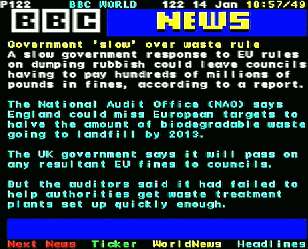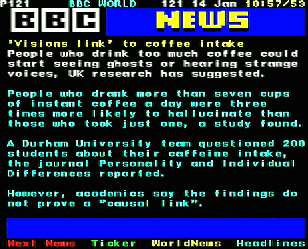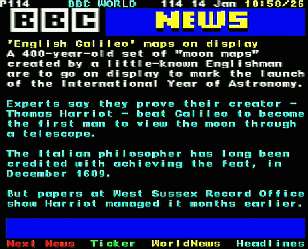Rick's b.log - 2009/01/14
You are 18.226.93.138, pleased to meet you!
Rick's b.log - 2009/01/14 |
|
| It is the 24th of November 2024 You are 18.226.93.138, pleased to meet you! |
|
mailto: blog -at- heyrick -dot- eu
Another:
Perhaps the simplest solution is to simply accept that this world is full of people who believe in God (in a variety of guises), people who believe in Allah, and, yes, people who don't believe in anything at all. I am happy for people to believe in whatever it is they believe so long as it is used as a life-affirming tool to help them in life and not as leverage to promote themselves and/or their cause at the expense of others.
An interesting segue from religious beliefs to visions of a different kind:
And for us tea drinkers...?
Finally:
In astral terms the moons of Jupiter, the movement of Venus and the discovery of sunspots.
So maybe Galileo was beat to the sighting of the moon by Thomas Harriot. Oh well. I don't really believe that will change Galileo's legacy, and... well... Thomas who?
Casting an eye over the news
Here's the first article, courtesy of BBC World teletext:

In essence it doesn't matter much as it is the ordinary person (i.e. you and me) that will cough up the cash. The difference here is that rather than being consumed as part of some generic eco-taxation, the local councils could find their allocated resources depleted by fines - thus less money for local services (policing, safety (streetlights and such), schools, etc).
If nothing else, this certainly shows the mindset of the current British leadership (though, too be brutally honest, "leadership" is to strong a word).

At boarding school, Sunday church attendance was mandatory. Practically the only time we wore blazers and ties, it was a miserable damp cold building (winter was awful) and we were dressed in clothing that was anything but comfortable, listening to some boring person reciting stuff that I have serious doubts about in a monotone. I quite liked the hymns, and it was always amusing at the end of "Oh Jesus I Have Promised" where the song just ends yet some never got the hang of it so we'd hear a loud burst of the final chorus before those belting it out would suddenly realise everybody else has stopped singing. However, while the church was never really a part of my life before my time at boarding school, I grew to hate it. It seemed such a complete waste of time; and how can you correlate God loving his flock (and all the rest of the rhetoric) with the evil going on in the world. And this was back in the mid-eightes, before embedded reporters and before television news had the balls to fill our little screens with the rotting carcasses of the recently murdered.
As for actual belief, I swing from athiest to agnostic on an almost daily cycle. There is no evidence whatsoever for any form of 'creator', however there is far too much that seems to correlate to other things that makes pure dumb luck seem a little shallow as far as explanations go. What I can discount with a high degree of certainty is organised religion - namely Christianity, but I would imagine that Judaism, Islam, etc, are on much the same basic lines even if the specifics vary. Something I absolutely will not accept is a belief structure that uses their implicit superiority to oppress and injure others. We are seeing this in our times perhaps most strongly in the Islamic "jihad", but never forget that America uses "God" a lot in and with their own terrorist activities. The idea certainly isn't new, the Christian lot went on a sickening rampage known as The Crusade, and not content with killing people afar, the infamous witch hunts allowed communities to turn on each other with the blessing of The Church.
Religious belief is a very strange creature, for it purports to demonstrate tolerance, while at the same time being rather definite about what to make of those who worship false idols. Tell me, in the eyes of a die-hard Christian, what is the difference between a Jew and those people in the desert who worshipped the golden cow? Answer? Nothing. Both are worshipping a different embodiment of "God" than The One True God; and therein lies the answer to a lot of suffering - everybody believes they are right and everybody else must therefore be wrong. You cannot rationalise that with any ideology of tolerance. The most logical answer - that God is God is Allah is Jehovah is.... well, I'm sure wars have been started over lesser points of religion.
To this end, the idea of people being able to voluntarily opt out of their school's group worship is the best and most logical approach. Those who don't believe, or have doubts, or perhaps even believe something else, can duck out; while those who believe can continue. This would suit everybody; now isn't that the very essence of tolerance?


In physical terms - inertia and density, for we all know the urban legend about dropping different things off the Leaning Tower of Pisa to show that the speed of fall does not depend upon weight, a more practical application being the flight of arrows and cannon balls and bullets to ensure the mark hits the spot (it's all about mathematics).
A steady and practical dismantling of Aristotelian theory, which was strongly resisted by followers, though today the Aristotelian theories seem almost too absurd to be real.
However the key depiction of our earth not being the centre of the universe is possibly the single greatest achievement of his life. Heavily censured and ridiculed by the Roman Catholic church, he was sentenced to house arrest (originally life imprisonment) in 1633 on the charge of heresy. It didn't take too long for the world to wake up and realise that the earth is not the centre of the universe (the moons of Jupiter show something orbiting another body) and it wasn't until the twentieth century that we finally figured out that our little lump of rock orbits an unimportant and relatively small star at the end of an unimportant arm of an unimportant galaxy. And, also, it wasn't until the twentieth century - 1992 in fact - that the Roman Catholic church (under the direction of Pope John Paul II, from an investigation started in 1979) had the courage to publically apologise for the treatment of Galileo. But the damage had been done to both sides. The church had overplayed its power and people became wary of its ability to stamp on any discovery that didn't fit scripture, and although it took a lot of time, the battle between the established authority and freedom of inquiry and thought turned more and more towards making discoveries and trying to understand the world. The Roman Catholic church still gets involved, a recent television programme showed them as being rather displeased about scientists wanting to unravel God's mystery - namely The Big Bang event - however the church does not have many powers left to halt the progress of science. Whether the Vatican likes it or not, The Hadron Collider exists and will be used. They can just breathe a small sigh of relief that it isn't going to be used tomorrow, and if when it is, it will produce a stream of seemingly meaningless data - the mysteries of the universe and God's creation will continue to elude us; but search we will, for it is in our nature to explore, and Galileo stands as the central figure in the fight between truth and oppression; his long house arrest and the treatment of his works (at the time) were the price he payed in order that centuries later we can even be able to ask questions such as "what came before The Big Bang?" and publish serious books alluding to God, if (s)he exists at all, being a blind watchmaker who, having set everything in motion, is neither able to see or control the universe, perhaps only tweak it now and again (i.e. as much control as a watchmaker has over time itself).
No comments yet...
| © 2009 Rick Murray |
This web page is licenced for your personal, private, non-commercial use only. No automated processing by advertising systems is permitted. RIPA notice: No consent is given for interception of page transmission. |